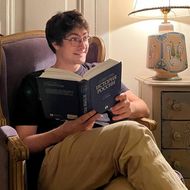An International Master Student and Russian Philology


Louis Rossier
I consider myself a lover of literature, rather than a researcher. As in the case of medical doctors, sometimes it's better not to love what you study because it allows to keep things at a certain distance. If you're passionate about literature, it will arouse strong reactions, a text might enchant or infuriate you. If a text infuriates you, it's hard to study it. Philological research therefore was not always a pleasant affair for me.
Another aspect that can be a let-down, if you enter this sphere driven by a love for literature, is that, if you want to make interesting things, you have to limit your study field. The smaller it is, the easier it is to find things that awaken your interest, new things to say. But at the same time, the smaller the object, the more insignificant, the less relevant for your human experience outside of research. You can’t devote a paper to “The Brothers Karamazov” as a whole, nor cover all of its aspects. So due to the small size of the lens through which you look on literature, philological research is bound to miss the essential that lies in the big picture, which is a paradox, because the works we study actually do tell us what's essential on this earth, shedding light upon our human condition, the pains and joys of being a human. For this reason, I think there is a bit of a gap between the importance of the object we study and the importance of our papers. I suppose it should bring us humility.
But if you enquire, not on the personal meaning of philosophical research, but how do I conceive it at a distance, well, there are different ways to study literature. You can work with archives, letters. In this case, your methods will be similar to those of a historian. When it comes to the tradition that was born with the formalist Russian school, you look at a text and identify what artistic tools the author uses to express a certain idea or feeling, how form and content enter into a dialogue. It requires attentive and repetitive reading. Eventually, you inevitably end up knowing your texts so well. It reveals different layers of the text invisible at first glance, which can be rewarding.
I'm not familiar enough with the various national perceptions of literature that would compose a "European" view on literature (I can only guess how a Portuguese, an Irish, a Finnish, a Hungarian or a Greek would think of literature), and if I try and compose a compromising European view of the medium, I would rather include the Russian view on literature rather than opposing it. But I can compare Swiss and Russian perception of literature. It’s important to mention there’s a gap between academic and general public views. In Switzerland, literature is not as highly considered by the general public as in Russia; it is certainly not a cement of national identity; it is not either associated to a certain class status: a lot of my friends who finished university have never opened a novel after completing high school and probably could not name a single Swiss writer. Overall, literature is considered as something unimportant. This lack of consideration might be one of the reasons why I became interested in Russian culture in the first place, I felt that its emphasis on literature was well justified.
I think between Swiss and Russian academic fields there’s no such drastic difference. Maybe due to the volume of publications and of the national character of the field of study, Russian researchers tend to ignore a bit more what happens abroad, but they seem to belong to one single community. Yet I had a feeling during my master that certain ideas associated with a left-leaning intellectual tradition in the West (the neo-structuralism, the psychoanalytic and sociological approaches to literature, or the ideas associated with the emergence of the "nouveau roman") were perceived somehow uncritically in Russia, as a step forward in literature science rather than a particular intellectual phenomenon, with its adepts and critics.
I think it's quite difficult to point out all-encompassing aspects that would apply to all its representatives. What do Gogol, Svetlana Alexeevich, Karamzin, the Strugatsky Brothers, Ilf and Petrov, Tsvetaeva, Brodskij, Nabokov and Platonov have in common? Not much, except maybe that they write in Russian. It sounds like a triviality but it means that they compose with the specificity of the Russian language, its flexibility, its melodicity, its unexpected associations (peace and world bound in the single word 'mir'). The richness of Russian poetry pays tribute to Russian phonology, which imposes a stress on every word, unlike French that had to favour the alexandrin for this reason. So the first interesting aspect is the language itself.
The second aspect that unites all Russian writers is a common history. Russian history, like all national histories, is unique, but it's arguably less straightforward and docile than Swiss history. Writers had to adopt a position in regard to this history: how to include it in their works or how to ignore it. Novels like Dr Jivago, War and Peace, Life and Fate illustrate this relation in a straight-forward way. They couldn't have been written in Switzerland because the history that inspired them didn't happen in Switzerland. Thirdly, and it is linked with the second one, on a personal level many Russian writers had to face life-changing dilemmas (like: exile or silence) that usually spared foreign writers. Those dilemmas in turn were reflected in their works as they gave a chance to the writers to prove their value and to grow intellectually and spiritually. As you see, if you want to specify aspects that would work for Russian literature in general, you inevitably have to limit yourself to extremely basic ones.
I think it's fruitless to try and apply a common adjective to the whole of Russian literature. Ilf and Petrov are not depressing, for example. Nor is Gogol. The qualificative is usually associated with Dostoevsky, but honestly, even in this case, I would tend to object as there's much light and hope to be found in his novels. We are not meant to identify the vilest of his characters. In The Brothers Karamazov, he makes it pretty clear that Alyosha is the example to follow. All of his novels contain pure figures of morality that act as a beacon, therefore I never perceived Dostoevsky as a depressive author.
I think I will answer this question in the following way: which Russian authors could you end up reading without beforehand having an interest in Russia? I think this list is pretty small. It's, of course, Dostoevsky, Gogol, Chekhov, Bulgakov, Solzhenitsyn, maybe some prose from Pushkin like “The Captain’s Daughter” or "The Queen of Spades". If someone is a bit more interested in literature in general, they may pay attention to “Doctor Zhivago” by Pasternak, to Turgenev or Lermontov. As for poetry, I suppose it’s not well-known in Western Europe because it requires a certain mastery of the Russian language. It's ironic because Dostoevsky was convinced that Pushkin was the most universal among all Russian writers, while he considered his novels are specifically Russian and impenetrable for foreign readers. Yet nowadays Dostoevsky is the most widely read Russian writer.
I didn't really choose the subject. It was my scientific adviser Aleksey Vdovin who suspected that Grigorovich used some motifs from Sue’s novel "Martin, l'enfant trouvé" in the novel "A displaced family" («Переселенцы»). But it's interesting to wonder why the peasant world became a common subject for both writers. I think it's partly explained by emerging social ideas and awareness. In Russia as in France peasants, with their specific fears, pains, joys distinct from the ones of city dwellers, had yet to be represented in a full-length novel. Also, a certain political sensibility led writers here and there to take an interest in the underprivileged sections of society. And surprisingly enough, studying the topic, I realized Russian and French peasant worlds were quite similar in terms of dependence on a landlord, despite the specificity of both contexts.
I think it depends on the subject of your research. Ideally, the studied text should command the methods of the philologist. Best papers I’ve read tend to obey their material. In this sense, without historical context, it is hard to understand works like “Doctor Zhivago” or “The Master and Margarita”. I'm not sure the historical context is always of major importance when studying works that lean towards fantasy or works that have a more personal resonance. Historical approach is not the one to prioritize all the time, but you can apply it to see what results it’ll provide you with.
Among “second tier" authors I usually recommend Gaito Gazdanov (“An Evening with Claire”), Saltykov-Shchedrin (“The Golovlyov Family”, “Old Years in Poshekhonye”), Olga Slavnikova (“2017”), Yuri Mamleyev (“The Sublimes”).
It challenged my Russian, analyzing a text not written in your native language takes a long time. Translating tools eased my aim. Besides, reading 19th century novels, you face archaic vocabulary you can’t find in every dictionary. So the research really enhanced my resilience. I concluded it’s always necessary to work on a subject worth studying to you. Research will be successful when its importance’s clear.
Primarily, pick a topic that really excites you because your research will mostly be led alone in a dark room, and the study itself should suffice to comfort you in moments of doubts, to convince you of the importance of your task, because your colleagues or scientific advisor won't be there to do it.
I think I would also urge new people engaging in literature studies to perceive every article they read in a critical way. Articles written under the Soviet Union tend to be well treated in this regard: students ignore the Marxist-Leninist ideological framework to focus on what's still relevant today. I would like to see them approach Western publications with the same caution, as many foreign ways to approach literature are not authoritative and represent only a trend or an intellectual tendency. If there's one authority not to question, it should be the text itself; while searching for hidden meanings, one should pay attention not to invent some, and if a method extracts from the text an idea that seems to contradict the text itself, the method deserves to be questioned, rather than the text.
Interviewed by

